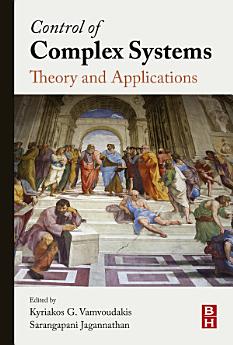Control of Complex Systems: Theory and Applications
About this ebook
Ratings and reviews
About the author
Kyriakos G. Vamvoudakis is the Dutton-Ducoffe Endowed Professor at The Daniel Guggenheim School of Aerospace Engineering at Georgia Tech. He holds a secondary appointment in the School of Electrical and Computer Engineering. His expertise is in reinforcement learning, control theory, game theory, cyber-physical security, bounded rationality, and safe/assured autonomy.He has served on various international program committees and has organized several international conferences. He currently is a member of the Technical Committee on Intelligent Control of the IEEE Control Systems Society, a member of the Technical Committee on Adaptive Dynamic Programming and Reinforcement Learning of the IEEE Computational Intelligence Society, a member of the IEEE Control Systems Society Conference Editorial Board, an Associate Editor of: Automatica; IEEE Transactions on Automatic Control; IEEE Transactions on Neural Networks and Learning Systems; IEEE Computational Intelligence Magazine; IEEE Transactions on Systems, Man, and Cybernetics: Systems; IEEE Transactions on Artificial Intelligence; Neurocomputing; Journal of Optimization Theory and Applications; and of Frontiers in Control Engineering-Adaptive, Robust and Fault Tolerant Control. He had also served as a Guest Editor for, IEEE Transactions on Automation Science and Engineering (Special issue on Learning from Imperfect Data for Industrial Automation); IEEE Transactions on Neural Networks and Learning Systems (Special issue on Reinforcement Learning Based Control: Data-Efficient and Resilient Methods); IEEE Transactions on Industrial Informatics (Special issue on Industrial Artificial Intelligence for Smart Manufacturing); and IEEE Transactions on Intelligent Transportation Systems (Special issue on Unmanned Aircraft System Traffic Management). He is also a registered Electrical/Computer engineer (PE), a member of the Technical Chamber of Greece, an Associate Fellow of AIAA, and a Senior Member of IEEE.
Dr. Jagannathan Sarangapani (referred here as S. Jagannathan) is at the Missouri University of Science and Technology (former University of Missouri-Rolla) where he is a Rutledge-Emerson Endowed Chair Professor of Electrical and Computer Engineering and Site Director for the NSF Industry/University Cooperative Research Center on Intelligent Maintenance Systems. His research interests include neural network control, adaptive event-triggered control, secure networked control systems, prognostics, and autonomous systems/robotics.




